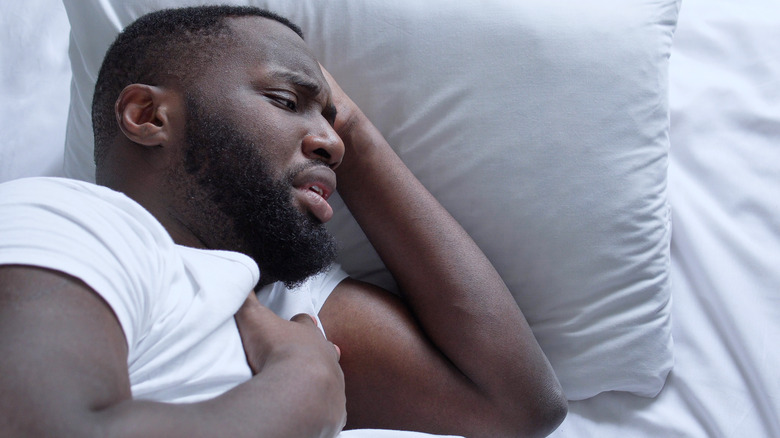What Having A Nightmare Does To Your Body
When asked about the subjects of their most frequent nightmares, the responses of 2,000 people to AmeriSleep revealed falling, being chased, and death to be among the top three answers. According to experts at Psychology Today, dreaming can occupy over two hours of our time spent snoozing, and it's during a particular phase of sleep that both good and bad dreams emerge.
Rapid eye movement sleep — otherwise termed REM sleep — is where we spend roughly 20% of our time over the course of the night (via Harvard Medical School). Occurring during this stage of sleep, nightmares tend to strike about halfway through the night. Often remembered in vivid detail upon waking, young kids between 3 and 6-years-old are among those most prone to nightmares. However, adults are certainly not immune. While scientists can't say for sure why humans have bad dreams, some believe that nightmares are the body's way of rehearsing and preparing for any worst-case scenarios, notes Psychology Today.
There is no doubt that nightmares can affect our emotions, but what about physical effects on the body?
How nightmares affect us during sleep and after we wake up
Sleep expert Dr. Michael Breus tells Bustle that nightmares can increase blood pressure and heart rate. In addition, they can also prompt sweating and quicken our breathing (via Psychology Today). This can all be traced back to the amygdala, which experiences a boost in brain activity during a nightmare. Tasked with emotion processing, the amygdala is a key player in the body's fight-or-flight response when faced with a real or perceived threat (via Verywell Health).
Interestingly, nightmares sometimes affect the muscles, but in ways that are opposite to what is expected during REM sleep. Normally, our muscles become temporarily paralyzed during this stage of sleep (via Bustle). Yet when having a nightmare, some people may flail, make facial expressions, or shout as one would if faced with the scenario in real life.
Additionally, some research has shown that nightmares have the potential to affect the body even after we wake up. Findings of a 2020 pilot study involving 30 volunteers who regularly experienced nightmares revealed that participants' mood, sleep, and health suffered in the two days following a nightmare. Participants also experienced an increase in ruminating thoughts.
If you find that nightmares are impacting your day-to-day life, consider speaking with a doctor. Per Harvard Medical School, treatment options such as psychotherapy or medication can be effective.


